Travel
New travel rules for Brits heading to Europe have been delayed yet again

CHANGES to rules for Brits entering other European countries have been delayed further, to make sure that all countries are ready to implement them.
What’s more, the rules have also been loosened to prevent lengthy queues forming at airports and borders.
New Schengen Area border checks were expected to be brought in from October 6 this year.
But that has since been pushed back to Sunday, November 10 at the earliest.
However, there is also a “last resort” option to postpone that further by a week to November 17, according to a report in The Independent.
This sees yet another delay to the system, which has been pushed back on several occasions, after an original launch date set as far back as 2021.
The new system, known as EES, will end the stamping of passports for non-EU travellers.
Instead, the new system will check passengers’ names, biometric data and the place of entry and exit.
Brits, along with other non-EU arrivals, will have to provide fingerprints, as well as facial biometrics before they arrive at the airport, ferry port or rail terminal from where they’re due to depart.
However, the Independent also claims that the rules around biometrics have been loosened in order to reduce the chance of large queues forming.
They claim that a “relief valve” will be introduced as part of the scheme, which will allow people at crowded checkpoints to avoid the biometric registration on first entry.
It is hoped that this will significantly ease the chances of delays.
Concerns had previously been raised about how long it will take for each and every passengers to be scanned in this way, with some authorities predicting an increase in processing times.
Earlier this year the Justice and Home Affairs Committee added to those concerns, warning that if the new system was implemented as scheduled this year, there will be “serious delays” for holidaymakers.
They were particularly worried about the negative effect it would have on passengers heading to Europe via Eurostar, ferry and the Eurotunnel at Folkestone.
The committee called on the then UK government to use “all diplomatic efforts” to delay the implementation of the rules.
The Sun’s Head of Travel, Lisa Minot explains the new system – and why it could cause problems
“THE looming introduction of the long-delayed European Entry Exit System could lead to yet more pain for passengers leaving the UK.
“The new system – designed to strengthen the European borders – will require every passenger to have their biometrics recorded.
“Every traveller will have to scan their passport and have a facial biometric before providing prints from the four fingers on their right hand. Children under 12 will have to do the biometric but will not have to have their fingerprints taken. All will then have to answer four questions about their reason for travel.
“Both fingerprints and facial biometrics will be required the first time a traveller uses the system, and then just one of the two for every subsequent trip. Then every three years you’ll be expected to go through the full process again.
“While airports across Europe have the space to add this additional process it is still going to add a huge amount of extra time to the customs checks. Although it will remove the need to have stamps in your passport, everything will still need to be checked either by a border officer or an e-gate.
“Where things could get really bad are at ports like Dover – where there are significant space constraints and multiple individuals will be travelling together in cars and coaches.
“Both Eurostar and Le Shuttle have invested millions in new facilities to process passengers but it is almost inevitable that the first few months of the system could lead to lengthy delays as we all get used to the new system.”
It’s not just the UK that has raised concerns about delays either, with others worried about how much time it will add to queues at EU borders.
The Slovenian government said it took “up to four times longer” to process passengers after conducting test runs.
Meanwhile, Austrian authorities warned that processing times would at least “double compared to the current situation”.
Croatia has also suggested that border checks would “certainly be significantly longer” once the EES was put in place.
This latest delay has apparently been implemented due to concerns that not all nations are ready for the switch from manual to digital checks.
EU officials are also keen to not have long queues of passengers during the UK October half-term holidays.
Meanwhile, these are mistakes you should never make at airports.
And earlier this year airports had to reintroduce liquid rules after they had scrapped them.












.jpeg?tr=w-1200%2Cfo-auto)
